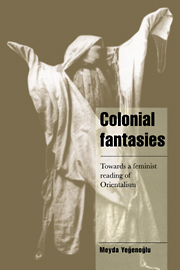Book contents
- Frontmatter
- Contents
- Acknowledgment
- Introduction
- 1 Mapping the field of colonial discourse
- 2 Veiled fantasies: cultural and sexual difference in the discourse of Orientalism
- 3 Supplementing the Orientalist lack: European ladies in the harem
- 4 Sartorial fabric-actions: The Enlightenment and Western feminism
- 5 The battle of the veil: woman between Orientalism and nationalism
- Notes
- Bibliography
- Index
4 - Sartorial fabric-actions: The Enlightenment and Western feminism
Published online by Cambridge University Press: 22 October 2009
- Frontmatter
- Contents
- Acknowledgment
- Introduction
- 1 Mapping the field of colonial discourse
- 2 Veiled fantasies: cultural and sexual difference in the discourse of Orientalism
- 3 Supplementing the Orientalist lack: European ladies in the harem
- 4 Sartorial fabric-actions: The Enlightenment and Western feminism
- 5 The battle of the veil: woman between Orientalism and nationalism
- Notes
- Bibliography
- Index
Summary
The final emancipatory gesture of Enlightenment thought would thus be its own liberation from itself, so that it is no longer recognizable as reason.
Robert Young, White MythologiesEnlightenment's other
The interlocking relation between the political rationality of colonial power and modernity has been demonstrated in many studies. Enlightenment reason, resting on the belief of the irreconcilability of non-modern ways of life with Western models of progress, serves as the connecting tissue between colonial and modernist discourses. The signifiers of the project of Enlightenment and humanism such as progress, modernization, and universalism have also functioned as legitimizing categories in the civilizing mission of colonial power. As Sartre notes, this relationship was more than a mere historical or conjunctural coincidence: the formation of universal humanism's ideal is predicated upon a racist gesture, for, in order to be able to proclaim its humanity, the West needed to create its others as slaves and monsters. In a different register, Gayatri Spivak commented on the affinity between the imperialist subject and the subject of humanism, as both share the sovereign subject status of authorship, authority, and legitimacy. Thus, to set up its boundaries as human, civilized, and universal, the Western subject inscribed the history of its others as backward and traditional, and thereby placed cultures of different kinds in a teleological and chronological ordering of history. It is this ordering which enabled the West to construe and affirm its difference from its others as temporal distance.
- Type
- Chapter
- Information
- Colonial FantasiesTowards a Feminist Reading of Orientalism, pp. 95 - 120Publisher: Cambridge University PressPrint publication year: 1998
- 1
- Cited by

